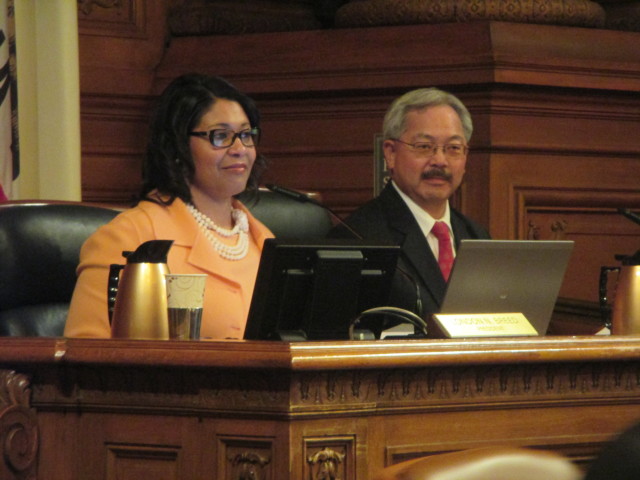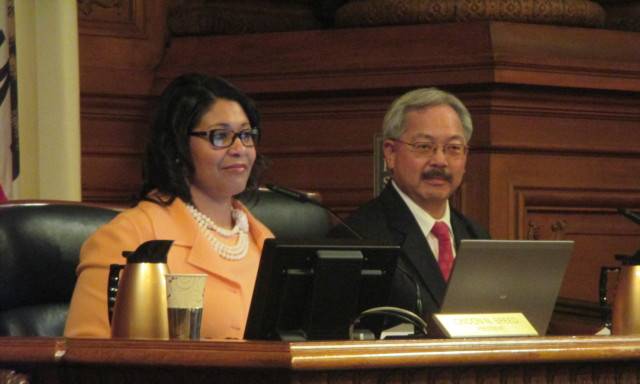You can see the shape of the new Board of Supervisors, and the impact of the November election, with the decision by President London Breed not to allow a speedy vote on providing legal counsel for undocumented immigrants.
Breed’s refusal to allow a waiver of the rule mandating a 30-day waiting period for all new legislation means that the Campos proposal will be kicked over to the new board – which will lack a progressive majority.

And it puts in stark contrast the public comments of the mayor, who insists he supports the Sanctuary City concept, and the reality of what happens when that policy hits the ground.
Campos is asking the city to allocate $5 million to guarantee that every immigrant facing deportation proceedings have the right to a lawyer. Half of that money would go to the Public Defender’s Office, and half to community-based organizations that work with immigrants.
He’s asked for an immediate supplemental appropriation because the election of Donald Trump creates an emergency situation, something pretty much everyone agrees on. It takes a while to hire people, and if the city wants to be out in front of the situation – if we want to be ready when the deportations start – the process has to start now.
But Breed has said no, it has to wait. I asked her why, and she didn’t respond.
But let me suggest what’s really going on, based on what I am hearing from solid sources (and my own understanding of how City Hall works):
Breed is listening to the mayor, who doesn’t want this plan at all. Lee was happy to hold hands and sing Kumbaya with everyone at City Hall after Trump’s election, and to talk about how we all love Sanctuary City, but his key people – that is, Chief of Staff Steve Kawa and media advisor Tony Winnicker – are demanding a much more limited approach.
For starters, they don’t want the public defender involved at all.
Why? Because the public defender (who happens to have the best infrastructure and the best ability to quickly ramp up and handle intake and other key issues) represents, by definition, people who are accused of crimes.
And the Mayor’ Men want to make a distinction between “good immigrants” and “bad immigrants” – that is, they don’t want to defend people who, rightly or wrongly, are charged with a crime.
That’s a horrible position to take, particularly since a lot of people, including immigrants, are arrested on charges that are not only wrong but wind up being dismissed. The PD’s Office is uniquely qualified to sort this all out. But the Mayor’s Men say no.
And why is Breed going along? Well, she really wants her aide, Conor Johnston, to be appointed to the D8 supe seat vacated by Scott Wiener.
So without a waiver, this will be bounced to the next board – and Campos will be gone.
On one level, that’s just stupid: Hillary Ronen, who will succeed Campos, is just as committed to this concept, and will simply pick it up. But the next board will lack a six-vote majority – control of the board will be in the hands of the mayor’s allies. So the plan could be watered down, defunded, or changed so that the public defender has no role … and then the mayor won’t have to veto it, and can tell everyone how much he loves Sanctuary City.
It’s kind of sick, really. But that’s what happens when the people who call themselves progressives but are really allies of the mayor get the support they need from some people who ought to know better and wind up getting elected to the board.
It appears, as far as I can tell at this point, that the decision of the board president can’t be appealed to the full board. But there will be a rally at noon Tuesday/6 at City Hall to urge Breed to reconsider.
And while the supes are ducking all over this issue, Shaping San Francisco will hold an event Wednesday/7 called “Divided We Fall: Immigration and Scapegoating.” It features Lara Kiswani of the Arab Resource and Organizing Committee, Grant Dil of the Angel Island Immigration Station, and author Bill Ong Hing of USF Law School. 7:30pm, 518 Valencia.
It’s no secret that Randy Shaw and I have our disagreements, but he’s got a strong, important piece today about an issue that I had missed: The Planning Commission will hear Thursday/8 a proposal that would gut the city’s residential hotel conversion ordinance.
The legal elements are complicated, but the bottom line is that developers would be able to convert SROs — a critical part of the city’s low-income housing — into tourist hotels without replacing the lost units:
The premise of the applications to be heard on December 8 is that it doesn’t matter how much hotel owners actually pay for replacement housing; instead, all they must do is find a housing developer willing to define their project as “replacement housing” for converted residential SRO units.
Here, applicants are using as their “replacement housing.” an entitled Tenderloin project at 361 Turk/145 Leavenworth. A project approved as a stand- alone project in 2015 that did not need conversion money to be built.
This faulty premise—that there need be no connection between the hotel converter’s financial contribution and the construction of replacement housing— underlies the conversion applications up for approval this week. Applicants have failed to provide any evidence that applicants are either building or contributing money for replacement housing, or that any funds potentially paid actually replace converted SRO units.
So which members of the commission are going to accept this scam?
Meanwhile, it appears that the mayor will not appoint a new supervisor for D8 until after the holidays. That leaves the board with ten members for the next two weeks; no big deal, since there are still six progressive votes for whatever comes up, and the new appointee won’t be one of them anyway, and everything changes in January anyway.
Still: The mayor seems to have trouble making up his mind. He still hasn’t appointed a police chief (although he told me we would have someone by the end of the year). And if Sup. Norman Yee has his way, the process will get a bit more interesting: Yee has a resolution coming to the Public Safety and Neighborhood Services Committee Thursday/8 calling on the mayor and the Police Commission to require that the chief live in San Francisco.
They all have, I think, in the 35 years that I’ve been here. And it makes sense to have the people in charge of emergency response services – the police chief, the fire chief, the heads of other key departments – not to be separated from the city by a bridge or tunnel if there’s, say, an earthquake.
Here’s an interesting one: The mayor wants to make it harder to grow pot indoors in the city’s industrial districts. The proposed resolution, which you can read here, would require a Conditional Use permit for any indoor ag cultivation (and let’s face it, we’re talking almost entirely cannabis here.)
I say interesting because there are a couple of factors going on. I have heard – anecdotally, but still persuasively – that indoor cannabis farms are driving up the price of Production, Distribution, and Repair space, not as intensely as tech offices but still, potentially crowding out other uses.
On the other hand, it’s a thriving industry – not one that requires a huge workforce, but there are people working in the biz and you don’t need a college degree to do it, and it pays, I am told, relatively well. It’s certainly “production.”
At some point, we will need a union of cultivators, trimmers, and associated workers. And we will need to address the zoning question of indoor ag. In the meantime:
Why is Mayor Lee picking on this particular business when he has allowed tech offices to take over PDR space at will – violating zoning laws with impunity – for years?
Why is cannabis a problem when tech offices – which drive up land costs even more – are just fine?
I’m all for good, tight, well-established zoning regulations. But let’s be fair – if we are going to crack down on pot farms, let’s crack down on the mayor’s buddies, too.
Either that, or maybe Ron Conway will invest in some pot farms, and this issue will vanish just like the rest of them.







